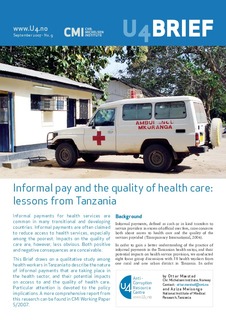| dc.contributor.author | Mæstad, Ottar | |
| dc.contributor.author | Mwisongo, Aziza | |
| dc.date.accessioned | 2018-01-04T08:20:22Z | |
| dc.date.available | 2018-01-04T08:20:22Z | |
| dc.date.issued | 2007-10-01 | |
| dc.identifier | oai:www.cmi.no:2746 | |
| dc.identifier.citation | Bergen: Chr. Michelsen Institute (U4 Brief 2007:9) 4 p. | |
| dc.identifier.uri | http://hdl.handle.net/11250/2475101 | |
| dc.description.abstract | Informal payments for health services are common in many transitional and developing countries. Informal payments are often claimed to reduce access to health services, especially among the poorest. Impacts on the quality of care are, however, less obvious. Both positive and negative consequences are conceivable.
This Brief draws on a qualitative study among health workers in Tanzania to describe the nature of informal payments that are taking place in the health sector, and their potential impacts on access to and the quality of health care. Particular attention is devoted to the policy implications. A more comprehensive report from this research can be found in CMI Working Paper 5/2007. | |
| dc.language.iso | eng | |
| dc.publisher | Chr. Michelsen Institute | |
| dc.relation | U4 Brief | |
| dc.relation | 2007:9 | |
| dc.relation.ispartof | U4 Brief | |
| dc.relation.ispartofseries | U4 Brief 2007:9 | |
| dc.relation.uri | https://www.cmi.no/publications/2746-informal-pay-and-the-quality-of-health-care | |
| dc.subject | Corruption | |
| dc.subject | Health | |
| dc.subject | Tanzania | |
| dc.title | Informal pay and the quality of health care: lessons from Tanzania | |
| dc.type | Report | |
